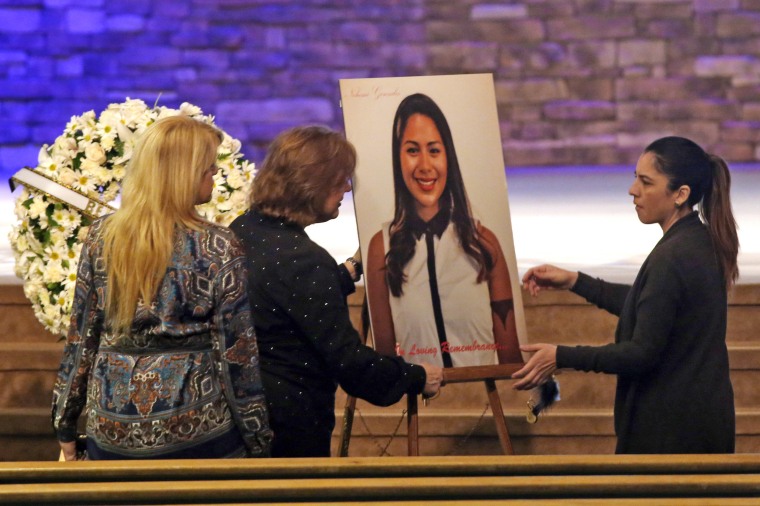Supreme Court wrestles with social media immunity in ISIS videos dispute
ISIS #ISIS

WASHINGTON — Supreme Court justices on Tuesday seemed skeptical about a lawsuit seeking to hold YouTube liable for suggesting videos promoting violent militant Islam, but some did raise questions about the scope of immunity that internet companies enjoy.
The justices heard oral arguments in a case alleging that by recommending videos that spread violent Islamist ideology, YouTube bears some responsibility for the killing of Nohemi Gonzalez, an American college student, in the 2015 Paris attacks carried out by the Islamic State terrorist group.
At issue is whether there are limits to the liability shield for internet companies known as Section 230 that Congress enacted in 1996 as part of the Communications Decency Act. The Supreme Court has never addressed the issue before, even as the internet has exploded.
A majority of justices appeared skeptical that YouTube owner Google could be liable for the underlying claim — a legal question that will be debated on Wednesday in a related case involving Twitter — but some also raised the question of whether Section 230 immunity sweeps too broadly.
“It seems to me the language of the statute does not go that far,” said Chief Justice John Roberts, addressing Google’s broad interpretation of Section 230.
When companies like You Tube are making decisions about what to recommend, and how, that is conduct that goes beyond merely allowing users to post on their platforms, he added.
“The videos don’t just appear out of thin air,” he said.
Likewise, Justice Ketanji Brown Jackson said that Section 230 was enacted to encourage companies to remove objectionable content. The issue of recommendations was “not something the statute was directed to,” she added.
Justice Elena Kagan pushed back on the argument made by Google’s lawyer, Lisa Blatt, that Section 230 would cover intentional efforts by social media companies to promote certain content.
“Should 230 be taken to really go that far?” she said.
The case, which tech companies warn could upend the internet as it currently operates, concerns whether Section 230 can be applied to situations in which platforms actively recommend content to users using algorithms.
 Women set up a picture of Paris attack victim Nohemi Gonzalez for her funeral service at the Calvary Chapel in Downey, Calif., on Dec. 4, 2015. Genaro Molina / Pool via AP
Women set up a picture of Paris attack victim Nohemi Gonzalez for her funeral service at the Calvary Chapel in Downey, Calif., on Dec. 4, 2015. Genaro Molina / Pool via AP
The novel legal issue has given rise to some unusual cross-ideological alliances, with the Biden administration and some high-profile Republican lawmakers, including Sens. Ted Cruz of Texas and Josh Hawley of Missouri, having filed briefs backing at least some of the Gonzalez family’s legal arguments.
Although some justices probed the extent of Section 230 protections, there is a still a good chance Google will eventually prevail in the case. Eric Schnapper, the lawyer representing the plaintiffs, faced a tough time persuading the court that the lawsuit has any merit.
“I don’t understand how a neutral suggestion about something that you’ve expressed an interest in is aiding and abetting,” said Justice Clarence Thomas, who has criticized the statute’s protections.
Fellow conservative Justice Samuel Alito also expressed doubt about Schnapper’s argument. “I’m afraid I’m completely confused by whatever argument you’re making at the present time,” he said
Some justices questioned why the issue wasn’t something more for Congress to address, rather than the court.
“We’re a court. We really don’t know about these things. You know, these are not like the nine greatest experts on the Internet,” Kagan said, drawing laughter in the courtroom.
Potential reform of Section 230 is one area in which President Joe Biden and some of his most ardent critics are in agreement, although they disagree on why and how it should be done.
Conservatives generally claim that companies are inappropriately censoring content, while liberals say social media companies are spreading dangerous right-wing rhetoric and not doing enough to stop it. Although the Supreme Court has a 6-3 conservative majority, it is not clear how it will approach the issue.
 Nohemi Gonzalez.Cal State via Facebook
Nohemi Gonzalez.Cal State via Facebook
Gonzalez, 23, was studying in France when she was killed while dining at a restaurant during the wave of terrorist attacks carried out by ISIS.
Her family alleges that YouTube helped ISIS spread its message. The lawsuit targets YouTube’s use of algorithms to suggest videos for users based on content they have previously viewed. YouTube’s active role goes beyond the kind of conduct Congress intended to protect with Section 230, the family’s lawyers allege.
The family filed the lawsuit in 2016 in federal court in Northern California and hopes to pursue claims that YouTube violated the Anti-Terrorism Act, which allows people to sue individuals or entities who “aid and abet” terrorist acts.
Citing Section 230, a federal judge dismissed the lawsuit. That decision was upheld by the San Francisco-based 9th U.S. Circuit Court of Appeals in a June 2021 decision that also resolved similar cases families of other terrorist attack victims had brought against tech companies.
The Supreme Court’s eventual ruling could have broad ramifications because recommendations are now the norm for online services, not just YouTube. Platforms such as Instagram, TikTok, Facebook and Twitter long ago began to rely on recommendation engines or algorithms to decide what people see most of the time, rather than emphasize chronological feeds.
Tuesday’s argument is the first part of a social media company double-header at the high court. On Wednesday, the justices will hear the related appeal brought by Twitter about whether the company can be held liable under the Anti-Terrorism Act.
The same appeals court that handled the Gonzalez case revived claims brought by relatives of Nawras Alassaf, a Jordanian citizen killed in a terrorist attack in Istanbul in 2017. The family accused Twitter, Google and Facebook of aiding and abetting the spread of militant Islamist ideology, which the companies deny. The question of Section 230 immunity has not yet been addressed in that case. If the court rules in favor of Twitter in that case, it may not need to rule on the scope of Section 230 in the Google case argued on Tuesday.
The Supreme Court has previously declined to take up cases about Section 230. Thomas has criticized it, citing tech giants’ market power and influence.